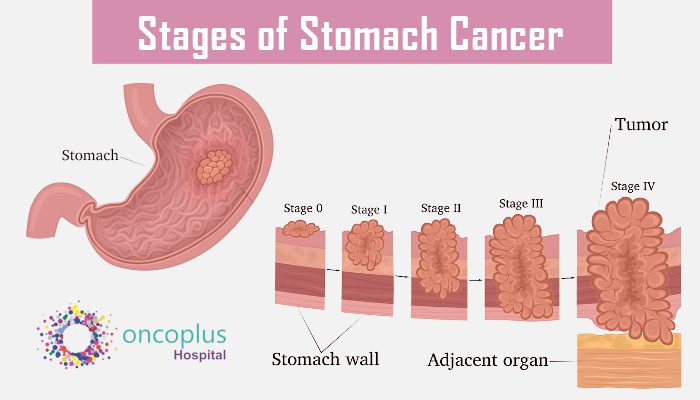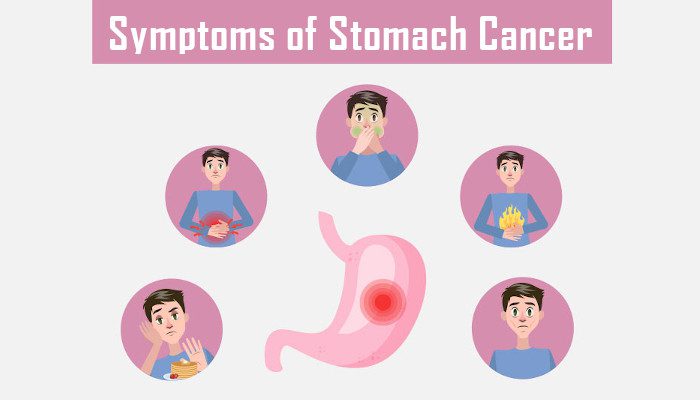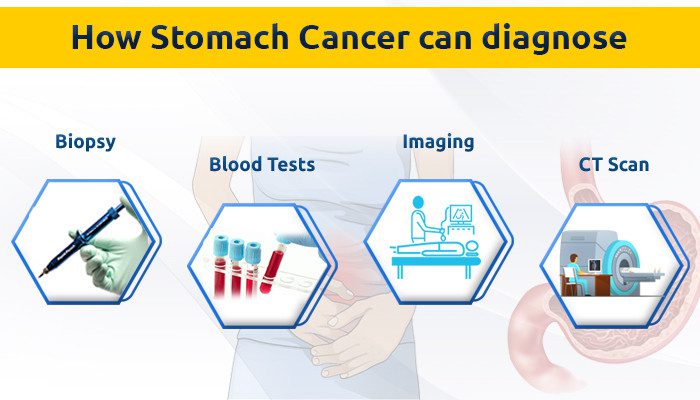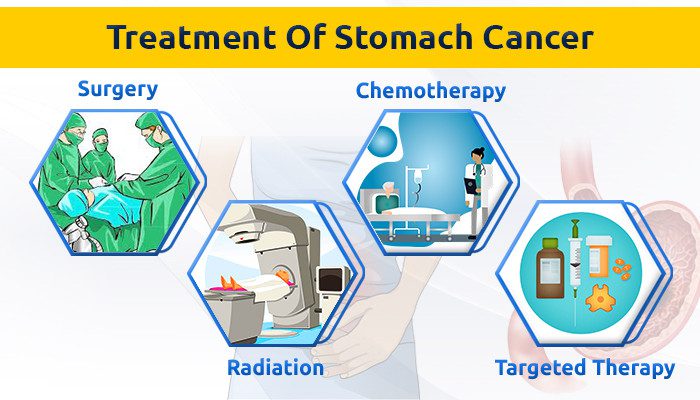Stomach cancer, also known as gastric cancer, is a serious condition that develops in the lining of the stomach. While it is relatively less common compared to other cancers, recognizing the signs and symptoms early is crucial for timely diagnosis and effective treatment. In this comprehensive guide, we’ll delve into the signs of stomach cancer, diagnostic methods used by healthcare professionals, and the various treatment options available to those diagnosed with this condition.
Signs and Symptoms of Stomach Cancer
Stomach cancer can present with a variety of symptoms, many of which may initially seem mild or unrelated. However, it’s important to pay attention to any changes in your body and seek medical evaluation if you experience the following:
- Persistent Indigestion: Chronic indigestion, characterized by discomfort or a burning sensation in the upper abdomen after eating, can be an early sign of stomach cancer.
- Unexplained Weight Loss: Significant and unintentional weight loss, not attributable to changes in diet or exercise, may signal an underlying health issue such as stomach cancer.
- Abdominal Pain: Persistent or recurrent abdominal pain, particularly in the upper abdomen, may indicate the presence of a tumor in the stomach.
- Loss of Appetite: A sudden decrease in appetite or feeling full quickly even after consuming small amounts of food could be a symptom of stomach cancer.
- Nausea and Vomiting: Frequent nausea and vomiting, sometimes with blood or a coffee ground-like appearance, should not be ignored and warrant medical attention.
- Difficulty Swallowing: Dysphagia or difficulty swallowing, along with a sensation of food getting stuck in the throat or chest, can be associated with advanced stomach cancer.
It’s important to note that these symptoms can be caused by various other conditions as well. However, if you experience any of these symptoms persistently, especially if they are new or unusual for you, consult your healthcare provider for further evaluation.
Diagnostic Procedures
When stomach cancer is suspected based on symptoms and physical examination, your doctor may recommend the following diagnostic procedures to confirm the diagnosis and determine the extent of the cancer:
- Endoscopy: This procedure involves inserting a thin, flexible tube with a camera (endoscope) through the mouth into the stomach. The doctor can visualize the inside of the stomach and take tissue samples (biopsies) from suspicious areas for further analysis.
- Imaging Tests: CT scans, MRI scans, or PET scans may be ordered to obtain detailed images of the stomach and surrounding tissues. These scans help assess the size and location of the tumor and identify any spread to nearby lymph nodes or distant organs.
- Biopsy: Tissue samples obtained during endoscopy or surgery are examined under a microscope by a pathologist to confirm the presence of cancer cells. Biopsy results also provide important information about the type and stage of stomach cancer.
Treatment Options
Treatment for stomach cancer depends on several factors, including the stage of cancer, the location and size of the tumor, and the overall health of the patient. The main treatment modalities for stomach cancer include:
- Surgery: Surgical removal of the cancerous part of the stomach (partial gastrectomy) or the entire stomach (total gastrectomy) may be recommended, especially for early-stage stomach cancer. In some cases, nearby lymph nodes may also be removed during surgery to check for cancer spread.
- Chemotherapy: Chemotherapy involves the use of powerful medications (anticancer drugs) to destroy cancer cells or shrink tumors before surgery (neoadjuvant chemotherapy) or after surgery (adjuvant chemotherapy). Chemotherapy may also be used as the primary treatment for advanced or metastatic stomach cancer.
- Radiation Therapy: Radiation therapy uses high-energy rays (such as X-rays or protons) to target and kill cancer cells or relieve symptoms such as pain or bleeding. It is often used in combination with surgery and/or chemotherapy for certain types of stomach cancer.
- Targeted Therapy: Targeted therapy drugs are designed to specifically target cancer cells’ vulnerabilities, such as blocking the action of specific proteins involved in cancer growth. Targeted therapy may be used in cases where stomach cancer has specific genetic mutations or is resistant to other treatments.
Read More Blog: HIPEC – An Advanced Chemotherapy Treatment To Destroy Cancer Cells
Conclusion
If you suspect you may have symptoms of stomach cancer or have been diagnosed with this condition, it’s important to take proactive steps to seek medical attention promptly. Early detection and treatment significantly improve outcomes for individuals diagnosed with stomach cancer. Remember, each person’s journey with stomach cancer is unique, and treatment plans should be tailored to individual needs and preferences.
Consult with a multidisciplinary team of healthcare professionals, including oncologists, surgeons, gastroenterologists, and supportive care specialists, to develop a comprehensive treatment plan that addresses your specific situation. Participate actively in your care, ask questions, and seek support from family members, friends, or cancer support groups to navigate this challenging time.
By raising awareness about the signs of stomach cancer and advocating for timely diagnosis and treatment, we can contribute to better outcomes and improved quality of life for individuals affected by this disease.
If you have any concerns or questions about stomach cancer or need support, don’t hesitate to reach out to your healthcare provider. Together, we can make strides in combating stomach cancer and improving patient outcomes.
Physical Activity Reduces Cancer Risk:
Physical activity is defined as body movements that require energy and use your muscles rather than resting. This includes walking, running, exercising, swimming, dancing, biking, doing housework, and participating in sports. If you perform moderate to vigorous physical activity on a regular basis, it will lower your risk of cancer as well as other chronic diseases such as heart disease, diabetes, etc. The physical activities will make you sweat and increase your heart rate. According to the research, if you avoid sitting and do any kind of physical activity, it will lower your risk of having cancer as well as lessen the side effects of cancer treatment. In this blog, you will learn how physical activity lowers your risk of cancer.
How will exercise help reduce the risk of cancer?
According to the study, people who exercise regularly have a lower risk of developing cancer. Inadequate physical activity causes a variety of health problems, including cardiovascular disease, diabetes, obesity, poor bone health, stroke, and depression. If you make a schedule to perform exercise on a regular basis, it will help you before, during, and after the treatment of cancer. If you rest or sit too much, then your body will not function properly, and your muscles will also get weak. Cancer specialists always urge their patients to be physically active as much as possible because it also lessens the side effects of cancer treatment.
If you exercise, then your body and brain will work better, reduce fatigue, improve your muscle strength, lessen your depression, sleep better, improve your immune system, increase your appetite, maintain a healthy weight, improve the quality of your life, decrease the risk of having cancer in the future, and most importantly, reduce the side effects of cancer treatment.
Physical Activity Lowers Cancer Risk:
- Colon Cancer:
Studies reveal that people who exercise frequently have a lower chance of developing colon cancer. People who exercise regularly have a 40% to 50% lower risk of colon cancer than those who don’t exercise. Persons who remain active throughout their lives have the lowest risk of developing colon cancer.
- Breast Cancer:
Women who engage themselves in exercise or any kind of physical activity will lower their risk of breast cancer. Inactive women have a higher risk of having cancer; this means that if the activity level of the women is low, it is more likely that they will suffer from cancer. It is very important that women increase their activity level to reduce their risk of cancer.
- Bladder Cancer:
Individuals who engaged in the most physical activity had a lower risk of bladder cancer than those who engaged in the least amount of physical activity. People who spend their leisure time doing physical activity will reduce their risk of bladder cancer.
- Endometrial cancer:
Endometrial cancer is basically cancer that develops in the lining of the uterus. Women who are physically active have a lower risk of endometrial cancer than those who are inactive. This is because physical activity reduces obesity, and obesity is a major risk factor for endometrial cancer.
- Kidney Cancer
The most physically active people had a lower risk of renal cancer than the least active people. The person can utilize their leisure time for physical activity to reduce the risk of kidney cancer.
- Stomach Cancer
People who are in the habit of doing regular exercise have a lower risk of stomach cancer compared to those who are less active.
Guidelines for Promoting Physical Activity in Children and Adults:
- Children should cut down on TV time and the time they spend playing video games.
- Do not use too many computers or electronic devices, as this will reduce your physical activity.
- Students should participate in physical activities in school.
- Adults should do yoga or participate in dancing to increase their physical activity.
- For doing exercise regularly, you should ask your friends, co-workers, or family members to support you.
To lower the risk of cancer, it is very necessary that you schedule exercise in your daily routine. Patients who are suffering from cancer should exercise less vigorously as compared to non-cancer patients. The main motto is to be as active as you can. Hence, you should schedule exercise in your daily routine to reduce cancer risk and make yourself more active.
Stomach cancer, also known as gastric cancer is a growth of cancerous cells inside the lining of the stomach. It gets extremely difficult to diagnose as most patients normally don’t show symptoms in the initial stages.
Gastric cancer is quite rare and dangerous as compared with other kinds of cancer as this disease is difficult to diagnose until after it spreads to other parts of the body, which makes it quite hard to treat. Stomach cancer is said to happen when healthy cells within the upper digestive system become cancerous and form a tumor, this tends to happen over many years and is a slow process.
There are a few risk factors, which might increase the risk of developing these cancerous cells like lymphoma, stomach infections that leads to ulcers, abnormal growth in the lining of the stomach and tumors in the digestive system.
Gastric cancer is common among people who are older, 50 years or more, smokers and genetics; people with a family history of this disease. There are a few lifestyle related factors, which might impact peoples risk of developing gastric cancer, for instance people who eat a lot of meat, salty foods, history of alcohol abuse and no exercise, can adversely affect the gut health.
An ounce of prevention is worth a pound of cure, if you feel that you’re at risk of stomach cancer, get Screening tests done at Oncoplus Hospital, which is a state-of-the-art center for cancer treatment in New Delhi. Screening tests are done on people who are at risk for certain diseases but don’t show symptoms yet.
Identifying signs and symptoms can help with treatment, sadly Gastric Cancer has no early signs or symptoms of stomach cancer and people only get to know when the cancer reaches an advanced stage, a few symptoms of advanced stomach cancer are stomach pain, which gets bad right after the meals, nausea, vomiting, bloody stools, bloating, loss of appetite with sudden weight loss and fatigue.
Normally stomach cancer is treated with one or more of the following; Chemotherapy, Radiation Therapy, Surgery and Immunotherapy. The clinician decides the exact course of treatment plan as per the type and stage of the cancer. The oncologist will not only treat the cancer cells but, will also prevent the cells from spreading. If left untreated, the cancer may spread to the lungs, bones, and the liver.
Gastric cancer cannot be prevented but people can lower their risk factors by modifying their lifestyle, eating balanced meals, quit smoking and exercise often. Tele Consult with our expert doctors at Oncoplus Hospital, Defence Colony, New Delhi, write to us info@oncoplus.co.in or call us at +91 85889 09091 to book an appointment and learn more about Gastric Cancer.



